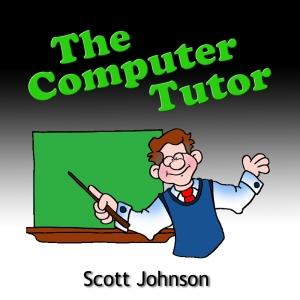The Computer Tutor

4 ways to free up space on your Windows hard drive
Years ago, hard drive space was an issue that I dealt with more often. Back in the days of 40 gb and 80 gb hard drives, it didn’t take a whole lot to fill one up. Then you started getting the warnings “Drive C is getting low on space”. These days, with hard drives more commonly in the 1 terabyte (1000 gb) range, it’s not as big of a problem (but that creates a different problem, which I’ll talk about in a minute). But even now I sometimes see a client’s computer that is getting pretty full. And by “pretty full” I mean that less than 10% of the drive’s storage capacity is still available.
Fortunately, there are a few things you can do quickly and easily to free up some space. In fact, you might even be surprised at how quick and easy it is.
First, you can delete temporary internet files. When you visit a website, your computer will often store the images from that site temporarily on your hard drive. That way, if you go back to that same site tomorrow or next week, the site will load more quickly because you’re loading all those images from your hard drive instead of downloading them from the internet again. As you might imaging, storing those images can take up a chunk of space on your hard drive. You can get rid of them.
Second, you can empty your Recycle Bin. I must confess, I don’t do this very often, and my Recycle Bin gets pretty full. Whatever is in there is taking up valuable hard drive space.
Third, you can delete temporary files. Wait a minute – isn’t that what we did in step one? Nope! In what might seem like a confusing choice of terminology, these are two different things. These temporary files don’t come from the internet, they come from programs installed on your computer. Some programs are designed to store some files on your computer for a period of time, but they aren’t really necessary for your computer to function properly, so you can get rid of them to save space.
Fourth, you can delete Windows Updates that are already installed and working. Don’t worry, deleting them doesn’t actually remove the update itself; it just removes the installer file that was originally downloaded. Sometimes these can take quite a bit of space, and you don’t need them any more since they have already been installed.
So there you are, four ways you can immediately save some space (maybe a lot of space). It sounds like you’ll have to jump through all kinds of hoops and follow a lot of complicated steps to do all those things, right? Wrong. It’s easy!
(Note: the steps below are based on Windows 7. If you have Windows 8 or 8.1, go to Control Panel and click to open Administrative Tools. Then double click on Disk Cleanup. Then start with Step 4 below. And yes, there are other ways to get to that same place. For another option on how to do this, listen to today’s podcast by clicking on the “play” button above.)
Here’s how you free up space on your Windows 7 hard drive:
1. Click the Start button (the MS logo in the lower left corner) and type: cleanmgr
2. At the top of the Start menu, click on cleanmgr.exe
3. Choose the drive you wish to clean up (usually this will be drive C):
4. The program will go through and analyze several areas of the drive:
5. Now you will see the results of the analysis. This is the window where you will look at the 4 areas we mentioned above, check the box for each one. You will see that there is a calculation of the total amount of disk space you will gain by deleting these files. In my case, it was a little over 7 gb. To proceed, click OK and then confirm by clicking “Delete Files”.
6. You’ll see a little progress window as the files are deleted:
When that’s finished, you’re done. If you want, you can go back and check it again and see that the totals have been reset back to zero (or close to zero).
You can run this and delete these files as often as you wish. But if you find yourself constantly running out of hard drive space, this is really only a temporary fix – you really need to either replace your drive with a bigger one, or add a second hard drive just for storage. Or, you could just get a new computer – the new ones come with huge hard drives and you’ll probably never lack for space.
One more thing. I mentioned above that the newer machines with the really big hard drives cause a different problem. That problem is disorganization. When your hard drive is small and you only have limited storage space, you tend to be organized, and frugal about what you put on the drive. Now, with the larger drives, many people just download everything and store stuff all over the place. Since they don’t have to be concerned with running out of space, they tend to be careless about how much they download and where it all goes.
You can of course use your computer any way you want, but my recommendation is that you keep it organized. This will save you time and potential headaches down the road, when you’re trying to remember where you stored a particular file or folder.






 Visit Podcast Website
Visit Podcast Website RSS Podcast Feed
RSS Podcast Feed Subscribe
Subscribe
 Add to MyCast
Add to MyCast